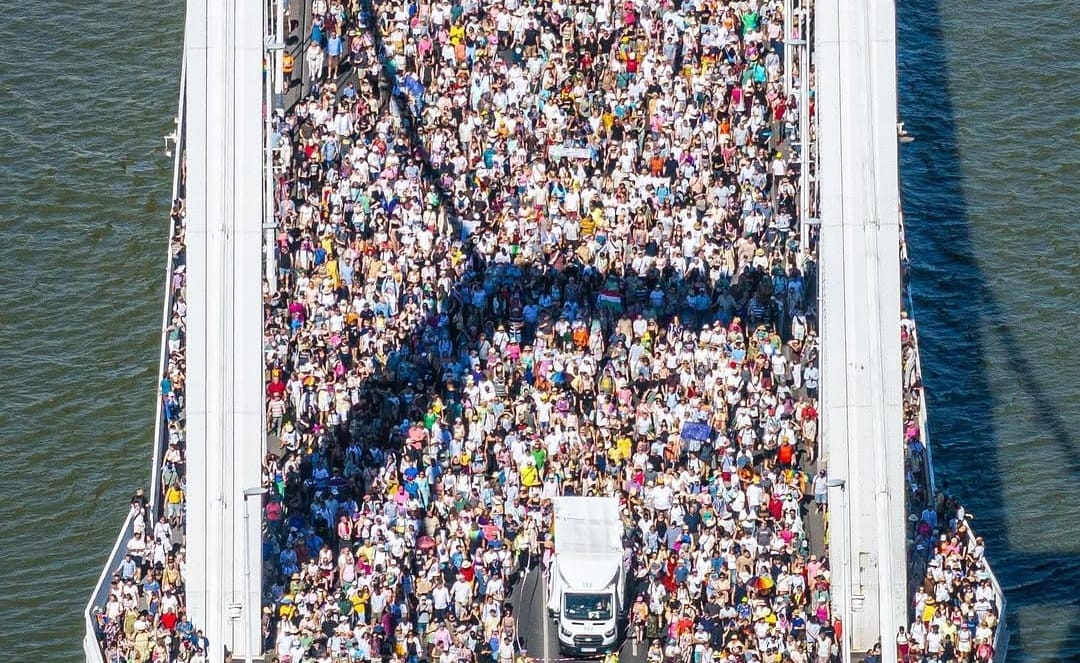Huge turnout for Pride in Budapest
Defying the government's attempts to ban the event, Hungary's queer community and allies hit the streets.

Over 100,000 people turned out for this year's Budapest Pride event - defying the government's attempts to ban the event.
Estimates indicate that the 2024 event had around 35,000 people take part, so it's clear that the government's anti-LGBTQ stance has backfired - spurring Hungarians to take to the streets.
Media reports indicate that it was mostly young people marching, with numerous banners mocking the government.
While the core of the marchers appeared to identify as part of the LGBTQ community, the broader issue of human rights had clearly attracted a wider spectrum of people to the event.
First published by Humen Magazine - republished with permission
How did we get here?
- 22 February 2025: Orbán Hints at Banning Pride. Speaking at a public event, the Prime Minister floated the idea of cancelling the Budapest Pride event, calling it a "waste of money and time".
- 17 March: Bill Submitted to Parliament. Members of Orbán's ruling coalition introduced a bill to ban Pride events and authorise using facial recognition technology to identify attendees. The bill was fast-tracked due to the coalition's two-thirds parliamentary majority.
- 18 March: Law Passed in Parliament. The Hungarian Parliament approved the bill with a 136-27 vote.
- 19 March: Backlash and Protests. Human rights organisations, activists, and opposition leaders condemned the law as violating freedom of assembly and expression. Budapest Mayor Gergely Karácsony vowed that Pride would still take place and promised city support for LGBTQ rights.
- 14 April: Constitutional Amendment to ban LGBTQ gatherings. The Hungarian Parliament approved the amendment with a 140-21 vote.
- 28 June: Budapest Pride. A huge turn-out for the city's LGBTQ Pride celebrations defied the government's attempt to ban the event.
What's life like for LGBTQ people in Hungary?
What’s life like for LGBTQ people in Hungary? Let’s take a look at some of the key equality indicators.
Is homosexuality legal in Hungary?
Yes. As modern-day Hungary emerged in the aftermath of World War I, the country’s penal code listed sex between men as a criminal offence. Homosexuality was decriminalised in 1961.
Are there anti-discrimination protections in place for LGBTQ people?
Yes. In 2000, the Constitutional Court recognised that the constitutional ban on discrimination based on “other status” covers sexual orientation as well.
Additionally, Hungarian law prohibits hate crimes and hate speech on the basis of sexual orientation and gender identity.
However these protections are being systematically undermined by the government.
Is there Marriage Equality in Hungary?
No, but there is legal recognition of same-sex relationships.
Legal recognition of same-sex relationships became possible in 1996 when Hungary adopted the concept of Unregistered Cohabitation. This recognised the rights of any couple living together in an economic and sexual relationship, and was applied equally regardless of gender or sexuality.
This was strengthened in 2009 when legislation was implemented that created registered partnerships for same-sex couples.
However, a significant barrier to marriage equality was introduced in 2012 with the adoption of a new constitution for Hungary. The new constitution explicitly restricts marriage to opposite sex couples.
What’s life like for LGBTQ people in Hungary?
Despite the anti-LGBTQ position of the country’s government, Hungary is a country where attitudes to LGBTQ people have been steadily evolving over time – particularly in the capital, Budapest.
When we look at the key equality measures, progress has been made but all of that feels under threat as the right-wing government continues to stoke anti-gay sentiment for political purposes.
In 2021, Hungary adopted new laws that ban the display and promotion of homosexuality in material accessible to minors. The move prompted the European Commission to refer Hungary to the EU’s top court, arguing that the law violates fundamental rights and the bloc’s values.
At the same time, some Hungarian politicians and government-controlled media outlets have been promoting homophobic narratives that marginalise LGBTQ people.
The ILGA report on LGBTQ Equality in Europe ranks Hungary 37th overall. With a total score of 22.7%, Hungary scored weakly on all criteria assessed.
